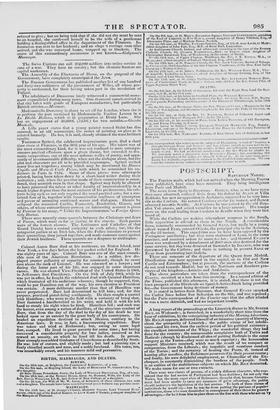The Swiss Cantons can call 262,000 soldiers into active service
in case of a war. They have no cavalry ; but the chamois-hunters are capital marksmen.
The Assembly of the Electorate of Hesse, on the proposal of the Government, have completely emancipated the Jews.
The Russian Government has published another list of one hundred and forty-two noblemen of the government of Wilnr, all whose pro. petty is confiscated, for their having taken part in the revolution of Poland.
The inhabitants of Damascus lately witnessed a commercial move- ment torparalleled during many years. One thousand camels arrived in that city laden with goods of European manufacture, but particularly
British articles.—Moniteur. • Mademoiselle Duvernay is about to set off for London, where she is to perform the part sustained by Mademoiselle Pauline Leroux in a Le Diable Buiteux, which is in preparation at Drury Lane. She has an engagement of 30,000f. (1:2500 for two months.—Gazette Musicale.
A Lille paper states that a young painter named Staler has dis- covered, in an old manuscript, the secret of painting on glass as it existed formerly. Ile has, it is said, already obtained the most brilliant results.
Tommasso Sgricci, the celebrated improvisatore poet, died a short time since at Florence, in the 38th year of his age. His talent was of the most extraordinary kind, for it was not confined to mere extempo- raneous poetical effusions upon a given theme, but extended to dra- matic composition, one of the most arduous walks of poetry, and appa- rently of insurmountable difficulty, when not the dialogue alone, but the plot and characters are all to be provided impromptu. Sgricci recited many five-act tragedies ; among which may be mentioned his Bianca Capello and Mole di Carlo Primo, with which he astonished his au- diences in Faris in 1824. Some of -these pieces were afterwards printed, having been taken down by a short-hand writer during their recitation ; and, when the peculiar mode of their construction is consi- dered, they astonish even in that shape. Sgricci may fairly be allowed to have possessed the talent or other faculty of improvisatorship in a much higher degree than the most eminent of his predecessors, his sub. jects being such as not only required the usual poetical estro, but a sus- tained flow of it, together with inconceivable readiness of conception and power of arranging continued scenes and dialogues. Herein he eclipsed the renouned Corilla, Fantastici, Bandettini, Gianni, and others, of whose extraordinary powers an interesting account is given by Fernow in his essay, " licher die Improvisatoren."—Foreign Quar- terly Review.
There were recently some quarrels between the Christians and Jews of Posen, which went so far as rioting in the streets. Both parties were of the lowest classes. The Lutherans and Catholics of that
Grand Dutch), have a mutual antipathy to each other; but, like the antagonist parties at an Irish fair, when the Police interfere to prevent their quarrelling, they joined together, and made common cause against their Jewish brethren. These quarrels are a disgrace to civilization.


























 Previous page
Previous page